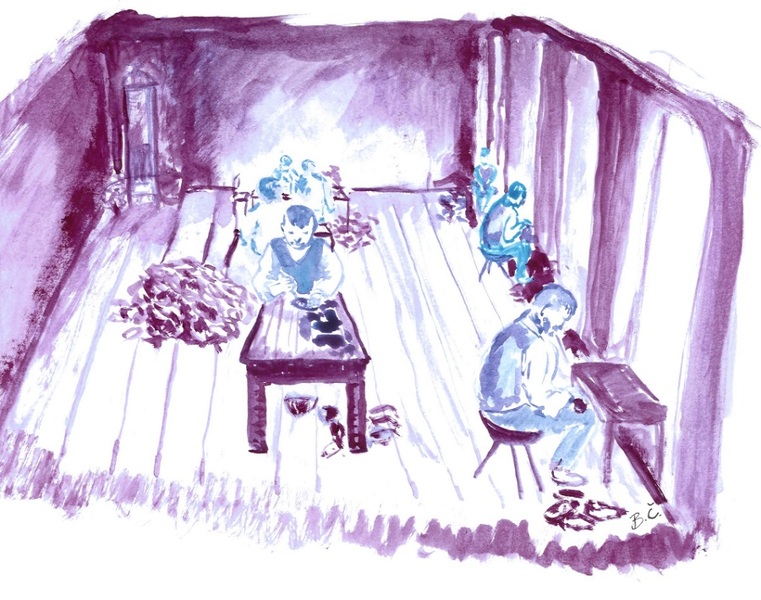Punish and Rehabilitate through Work: Institutions, Discourses, and Agency in Central, Eastern, and Western Europe at the End of the 19th and in the first half of the 20th century
 13. 11. 2024 – 15. 11. 2024
13. 11. 2024 – 15. 11. 2024
 Kampus Hybernská, Hybernská 998/4, Prague 1
Kampus Hybernská, Hybernská 998/4, Prague 1 
The workshop Punish and Rehabilitate through Work: Institutions, Discourses, and Agency in Central, Eastern, and Western Europe at the End of the 19th and in the first half of the 20th century, organized by the Institute of History of the Czech Academy of Sciences; Leibniz Institute for the History and Culture of Eastern Europe, GWZO; the German Historical Institute Warsaw and the Faculty of Humanities, Charles University, will take place from 13 to 15 November 2024 in Prague.
Workhouse, house of correction, reformatory, forced labour colony, disciplinary labour camp, etc. – these are only a few designations of the disciplinary institutions that proliferated across Eastern, Central, and Western Europe during the late 19th and in the first half of the 20th century. These disciplinary institutions served a dual purpose of confinement as well as correction. Behind their walls or within their compounds, citizens who deviated from the prevailing middle-class norms of “proper work” and “decent behaviour” were confined as well as corrected by making use of their labour. The declared aim of such institutions, whose tradition dates back to the early modern period, was therefore not only to punish individuals whose mobility, livelihood and other types of conduct were criminalised, but also to turn “alcoholics”, “beggars”, “delinquents”, “pimps”, “prostitutes”, and “vagrants”, to name only a few groups who were targeted, into “orderly citizens”.
Issues we would like contributors to address in the workshop are:
1. INSTITUTIONS AND ACTORS
What functions did these disciplinary institutions perform in the broader context of social processes of exclusion and inclusion?
How did the constitutive tension between the rehabilitation and confinement of inmates affect the position of these institutions within gradually diverging systems of punishment and social welfare?
Which actors (e.g. different bodies of the state, municipalities, churches, private companies etc.) were involved in different aspects of these institutions and in which ways?
2. IDEAS AND PRACTICES
How to interpret the relationship between the diverse contemporary discourses of rehabilitation and punishment, and the changing practice of the disciplinary institutions such as continental workhouses, forced labour camps and reformatories?
What role did the disciplinary institutions play in the discourses and imaginations of social outcasts, especially those who were labelled as “Gypsies”?
Did these popular as well as expert ideas and discourses shape the practice?
3. INMATES AND STAFF
Who actually were the people confined in these institutions, in terms of their age, gender, class, professions, ethnicity, nationality, etc.?
Why were they confined and in what ways were they deemed to need reforming?
Who was recruited as staff in the disciplinary institutions and how?
4. LABOUR AND ECONOMIC EFFICIENCY
What kinds of labour were used to correct male and female convicts and what concepts (e.g. forced labour or convict labour) could be used in order to capture the complexities of penal and economic goals?
How were the inmates’ conditions negotiated in relation to the labour market, wages, etc. in the outside world?
5. EVERYDAY LIFE AND METHODOLOGY
What were the living conditions and everyday life of the inmates and how did the everyday life of male and female convicts differ?
How were the social hierarchies and order negotiated by the inmates and the staff?
What types of sources and methods can be used in order to reconstruct everyday life and to capture the agency of the inmates and how?
6. (DIS-)CONTINUITIES
How did these disciplinary institutions change over time?
What role did the agency of inmates play in particular?
How were they influenced by political development of the state or local administrations?
Keynote Speaker: Sigrid Wadauer (University of Vienna)
Organisers:
Pavel Baloun (Institute of History, Czech Academy of Sciences / Faculty of Humanities, Charles University)
Lucie Dušková (Leibniz Institute for the History and Culture of Eastern Europe, GWZO)
Jaromír Mrňka (German Historical Institute Warsaw)
Klára Pinerová (Institute of History, Czech Academy of Sciences)
Jiří Smlsal (Institute of History, Czech Academy of Sciences)
 13. 11. 2024 – 15. 11. 2024
13. 11. 2024 – 15. 11. 2024
 Kampus Hybernská, Hybernská 998/4, Prague 1
Kampus Hybernská, Hybernská 998/4, Prague 1 

